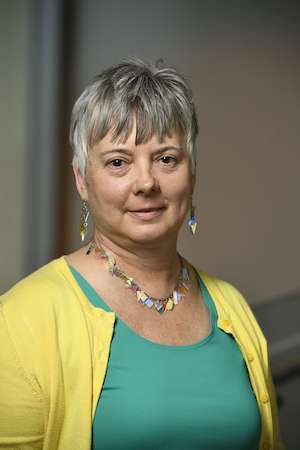
Creating a Trauma-Informed School System in Connecticut: Q&A with Bloomberg Fellow Joanne Tremblay-Jackson
March 19, 2020
Joanne Tremblay-Jackson started out in the Hartford County Public School System as a school social worker. Working in the school system was a second career for her, after years working in the nonprofit sector with the chronically mentally ill, developing multiple programs to address the needs of those who were being de-institutionalized with the closure of state psychiatric hospitals. Her move gave her the opportunity to address the mental health needs of children before those issues become chronic. “I’ve enjoyed working most with students who many saw as the most difficult,” she says. “Most often these students were the ones who had been the most misunderstood and mistreated by family and community. They had no reason to trust in adults or believe in others.”
Now, as the director of Student Support Services, Joanne develops trauma-informed and sensitive practice frameworks to support students. She serves on Hartford’s Rapid Response Team to assist and respond when youth are involved in gun violence. “Our school system and community have recognized the environmental trauma that many of our youth face, and how this and other traumas affect their ability to learn and even contemplate a future beyond surviving the day,” she says. “My interest in public health began as I contemplated how to assist the community, our adolescents, and the schools on a macro level. How does one change mindsets and belief systems, and instill hope? How does one impact a larger community for common benefit in the longer term?”
We spoke with Joanne about her work with the school system to prevent and heal childhood trauma and her goals as a Bloomberg Fellow.
What drives you, and how did this bring you to your interest in public health?
The power of mentoring and relationships drives me. I grew up in Waterbury, CT, as a child of working-class parents who learned English as a second language and had migrated to the U.S. for work and opportunity. Mentors helped me see possibilities and negotiate the college application process. I have always been interested in adolescence; I understand personally what a trying time this can be in one’s life and how important mentors, small acts of kindness, and acknowledgement of abilities can have a lasting, life-changing impact.
What public health-related work have you done that you’re most proud of?
Over the last two years our school system has begun to consider the “whole child” and the systemic changes needed to address the needs of the “whole child.” My work in this larger group effort is regarding trauma-informed and trauma-sensitive schools. I enlisted a group of colleagues to bring professional development to administrators across the district on trauma and its effects on learning. We met with the community providers of family and mental health services to enlist their support and resources to offer seminars and services that were trauma-informed in our schools and for our community groups, including parents. Most recently, we have signed an agreement that will offer professional development, resources, and supervision, so school social workers can offer cognitive behavior therapy trauma-informed groups in the schools for various age groups. These groups, with the collaboration of the Child Health and Development Institute of Connecticut and the Connecticut State Department of Children and Families, have a research component to collect data and quantify its impact on improving our students’ coping skills and their ability to focus and learn.
What question or problem in your community keeps you up at night?
How to curb adolescent violence, and how to ascertain when our youth lose interest in school and hope in their own futures. I worry and wonder what can be done so our young people are not out on the streets. Having little legal economic opportunity with less than a high school education can lead to vulnerability to predators and momentary decisions that have lifelong impact.
How is the Bloomberg Fellows Program helping you to tackle that problem? What impact do you hope you to make as a Bloomberg Fellow?
I am just beginning the program, but I’m looking forward to exploring the public health perspective, which is a macro, upstream way of thinking. I anticipate that my own way of thinking will be expanded, and I will have ah-ha moments. The fellowship will also offer connections to others who are contemplating and tackling similar issues across the country. These connections and relationships are key to expanding possibilities.
Hopefully, out of these new relationships and connections, a new way to engage our youth and improve their connection to school and increase opportunities will emerge. Hartford’s mayor, school system, and community providers all recognize the need to address the multiple traumas in our community affecting our youth and their families, which can become cyclical if left untreated. Community leaders seem ready to implement changes, and the public health perspective will assist in identifying solutions that can have longer-lasting impact for a larger portion of the community.
Connect With Us
Receive all the latest news from the Initiative by signing up for the American Health Dispatch newsletter, subscribing to the American Health Podcast, and subscribing to our YouTube channel.
Contact Us